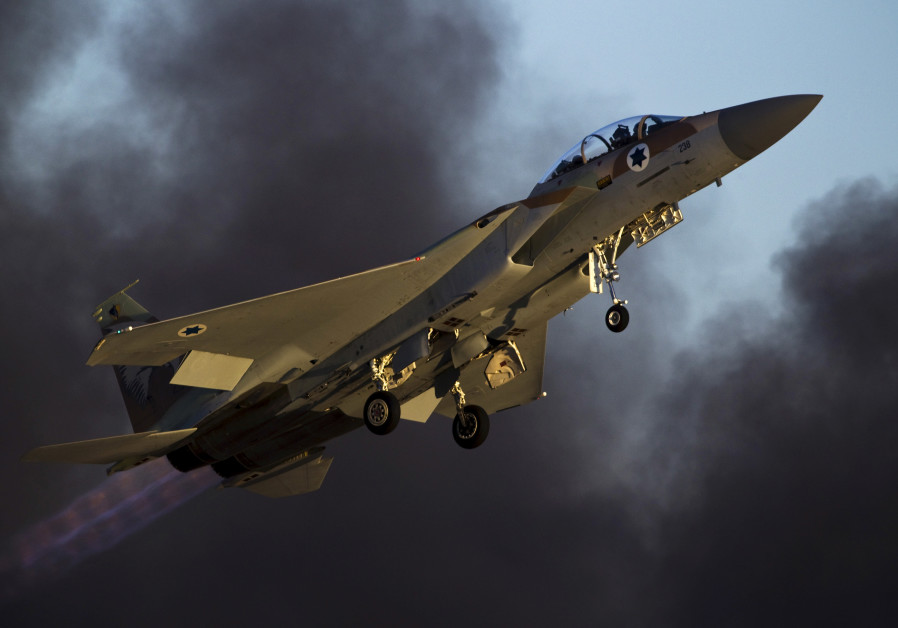FORMER IDF CHIEF OF STAFF: ISRAEL WAS READY FOR WAR FOLLOWING SYRIA STRIKE

An Israeli air force F-15 fighter jet flies during an exhibition as part of the graduation
ceremony of air force pilots at Hatzerim air base in southern Israel. (photo credit: AMIR COHEN/REUTERS)
Former IDF chief of staff Gabi Ashkenazi weighed-up the possibility that the country would wake up to yet another war after the strike on Syria’s nuclear reactor in 2007.
“You can never be sure, but I thought there was a chance,” said Ashkenazi, who headed the army during Israel’s destruction of Syria’s nuclear reactor in 2007, during an interview with Ynet following the lifting of the 10-year-old gag order by Israel’s military censor.
“It wasn’t by coincidence that we trained units on the Golan Heights, it was no coincidence that there was a drill. I don’t want to elaborate on all of the details, but in fact, we were sufficiently ready for another option,” Ashkenazi said.
After having received the concrete evidence that the facility in the desert of Syria’s northern Deir Ezzor province just months after the end of the Second Lebanon War, it was decided that Israel would conduct the operation with the lowest signature possible in an effort to deny any Israeli role in order to prevent any embarrassment to Syrian President Bashar Assad which could force him to respond in ways that could have spiraled into war.
To carry out the operation in a discreet manner would allow Assad “to tell his people another story,” the former chief of staff stated.
“After the pilots had landed, I went up to the 14th floor of the Kirya IDF headquarters, looked out of the window at Tel Aviv that was sleeping and said I hope we don’t have to wake the residents unnaturally. It took a few hours before we began to realize how the other side would respond to what had happened to it,” Ashkenazi added.
Maj.-Gen. (res.) Amos Yadlin, who headed Israel’s Military Intelligence at the time of the strike said on Wednesday that on the night of the strike, the IDF had two goals: Destroy the reactor and avoid war.
“On the night of September 7,[2007], we basically understood that we had two goals: No core, no war. Destroying the nuclear reactor on the one hand and avoiding a war on the other,” he said on a call organized by The Israel Project.
According to Yadlin, who during his time in the military took part in the destruction of two nuclear reactors by Israel, first as a fighter pilot taking part in the 1981 attack in Iraq and then as military intelligence chief during the operation in Syria, said that Israel finally admitted to carrying out the strike because, after a decade of deniability, Assad is unlikely to retaliate.
“Israel is a democracy with censorship that can be appealed to the supreme court. The media in Israel has been pushing to lift the censorship even when I was still in office in 2009,” he said, adding that in the decade since the operation, two main factors have changed, mainly Syria’s civil war.
Nonetheless, a lot of details about the operation have not been revealed, mainly Israel’s intelligence gathering capabilities.
And while not all of Israel’s role in the destruction of the al-Kibar nuclear facility has been released by the army, the IDF declassified a six-point letter from then IAF Commander Maj.-Gen. Eliezer Shkedi dated September 5, 2007, to the pilots who would execute the mission:
1) You are being sent today to participate in a mission of supreme importance to the state of Israel and the Jewish people.
2) The mission is to destroy the target and to disengage with no fallen aircraft, and to do so through as much “low signature” as possible.
3) The intention is for this action not to be connected, at least in the first stage, to the state of Israel and to minimize the potential for broader war.
4) The action is top secret before and after its implementation until a clear decision directs otherwise.
5) Counting on you. Believe in you and am convinced of your success.
6) Good luck.
Ten years later, while Syria has still not tried to restart their nuclear program, officials involved in the operation are warning that Israel’s admission to the reactor’s destruction is a warning to the Jewish state’s enemies, mainly Iran.
Source:Jerusalem Post
